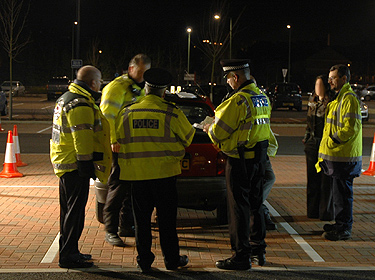Short, sharp shock should make our roads safer
Friday, 19th March 2010.

It is low to the ground, with darkened windows and its swollen exhaust makes an aggressive growling sound.
This is not an uncommon sight, but what made it different on Thursday was the two police motor-cycles shepherding the car towards a queue into a brightly lit area swarming with police and officials in high-visibility jackets.
The driver was one of 37 that evening who found their vehicle and themselves being put through a rigorous check for any infringements of the law.
It was part of Ring Of Steel a multi-agency operation led by police, aimed at catching criminals and deterring others.
The police were stationed on all the main roads on the edge of the town, and also patrolling within the built-up area and using ANPR, the number-plate recognition system to identify suspicious vehicles.
Then they brought them to the Cineworld car park where more police, HM Customs, UK Border Agency, and the vehicle standards agency VOSA were waiting.
If it looked and felt a bit intimidating, it was only a brief crackdown of seven hours, and it should have long-term benefits for local residents, particularly road-users.
Suffolk county councillor for Haverhill Tim Marks, a member of Suffolk Police Authority, was on hand to see what was happening.
He said the choice of Haverhill was an operational one by the police, but thought it was a very good idea and efficient use of resources.
"Driving uninsured is every bit as dangerous as other forms of crime," he said. "People who do that are a hazard to themselves and everyone else."
HM Revenue and Customs were on the lookout for people using illegal fuel, particularly red diesel, so they were most interested in the vans and trucks brought in.
Revenue fraud in road fuels in Great Britain is principally in the diesel sector and involves rebated off-road fuels like red diesel, kerosene and a range of oils known as 'tied' oils all of which carry little or no tax.
The key fraud types are: laundering - treating red diesel and kerosene with chemicals to remove their markers and dyes and make identification of use as a road fuel harder; mixing - combining kerosene or 'tied' oils with lubrication oils to make an illegal road fuel or to dilute road diesel; and misuse - illegally using red diesel in road vehicles when it is only intended to be used in off-road vehicles.
The UK Border Agency, which deals with illegal immigrants, has done some work over the past year in Haverhill, which led to successful prosecutions of some restaurants.
So what could they gain from what was basically a vehicle operation?
Chief immigration officer for Suffolk and Essex Jack Davis explained. "We are looking for HGVs with outstanding fines for illegal immigrant offences, and we also know that takeaways use cheap labour for delivery drivers.
"These people may be of interest to immigration, having slipped away from some other part of the country.
"Working with other agencies on an operation like this also helps us pick up intelligence and build up a picture for future activity.
"We have been busy in Haverhill more recently, but I think local employers are now getting wise to it and sorting themselves out with advice from us."
He said currently the commonest illegal immigrants were still mostly from Asia - Afghanistan, India, Bangladesh and Pakistan, and particularly from China in Chinese restaurants.
"Focusing on vehicles is a development for us," he said, "but a lot of illegal immigrants are involved in low-level criminality, and if they are interest to the police they are probably of interest to us as well."
Haverhill-UK photographer Steve Bryant visited the edge-of-town checkpoints to see ANPR in action, and found himself caught up in a police car chase.
Steve said: "I was amazed at the accuracy of the ANPR System (Automatic Number Plate Recognition). Even in near darkness it was accurately analysing each and every passing vehicle checking for such details as current insurance, driving license information, intelligence markers and more - all in the blink of an eye.
"Suddenly the ANPR System sounded the alarm and the two police intercept officers immediately honed in on the vehicle flagged by the system.
"Within seconds we had turned 180 degrees after the vehicle in hot pursuit, blue lights flashing and siren wailing.
"The sudden rush of adrenalin was incredible and I found even my own senses heightening as the police car darted around vehicles in front, most of whom had thankfully spotted us coming and had correctly pulled to the side of the road.
"Within two minutes the target vehicle had been stopped and the police officers went to work questioning the driver regarding the alleged offence.
"It was a superb demonstration of the incredible skill and bravery shown by each and every officer while carrying out their day-to day work and an amazing demonstration of the incredible ANPR System."
In the end, Thursday evening was just a short, sharp shock to law-breaking motorists in the area, but it may have longer-term effects.
Officer-in-charge PC Graham Clark, from Bury St Edmunds, said: "Hopefully it is sending a message to criminals using the road that they stand an excellent chance of being caught."

Comment on this story
[board listing] [login] [register]
You must be logged in to post messages. (login now)




